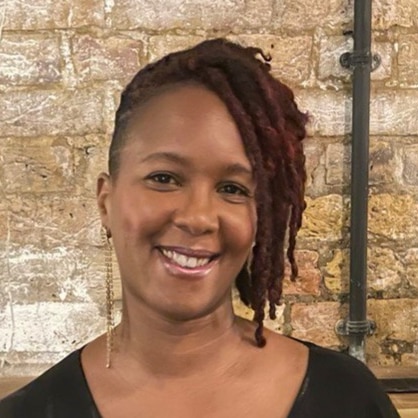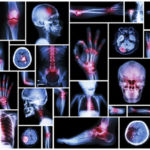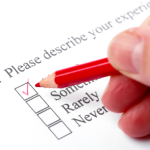
For our August newsletter, the Chronic Pain Partners media team interviewed a group of people to highlight the diversity of our community and emphasize the challenges that arise when a person belongs to more than one minority. In this interview, writer Beth Miller speaks with Cassandra Campbell, a coach, author and EDS advocate. Campbell shares how she learned to accept her chronic condition and adapted her life around EDS while achieving her goals.
Beth Miller:
Hi Cassandra, it’s so nice to meet you. I’m Beth, and I’ll be speaking with you about your experiences as a Black woman with EDS. Let’s start with your diagnostic journey. When were you diagnosed with EDS, and what was the journey like for you?
Cassandra Campbell:
I am 45 years old now, and I was diagnosed in 2010 when I was 33 years old. However, I started having symptoms when I was 13, so it took 20 years for me to get a diagnosis of “hypermobility” and suspected fibromyalgia. Three years later, I was confirmed to have hEDS by one of the top consultants at that time. Up until that point, I was very much dismissed. I wasn’t directly told that I was making it up, but it was insinuated, particularly in my teens. For years I was just told that it was chronic pain and given a lot of pills, even though nobody really knew what it was. So it took a very long time to be diagnosed.
Miller:
How has your journey been since you received the diagnosis? Do you feel like you are on the right track or are you still searching for answers?
Campbell:
Once I got the diagnosis, it was a combination of being relieved but also being quite devastated because there’s no cure. There were a lot of mixed emotions. Part of the process was telling myself, “Okay, this is what you’ve got; you’re going to have to find the best way to deal with it and get on with your life.” That’s what I have kept telling myself ever since.
A few years before my diagnosis, I more or less stopped taking medication on a regular basis because when I was about 20, I unintentionally overdosed because the medication didn’t work. Fortunately it wasn’t enough to be hospitalized, I just felt unwell for a while.That experience led me to the decision to try to find a way to cope without having to rely on medication. I did attend a pain management course, but as the aim was to help people reduce medication it wasn’t that beneficial helpful for me. However, through it, I learned that mood swings, being angry, feeling miserable are normal for somebody in constant pain. I learned to forgive myself a little bit for those emotions.
Up until recently, I didn’t have much support. I just learned to cope with my symptoms the best way I could.
I did eventually find a GP that was instrumental in helping me getting diagnosed, but he retired. Recently, I found a new GP who is quite good at listening and not being dismissive. He is supporting me to investigate some of the symptoms that have been going on since my childhood, like welts and incessant itching. It was diagnosed as urticaria when I was a child but we now both think it’s mast cell activation syndrome. But, of course, that wasn’t a diagnosis that had ever been considered before. We also suspect I might have POTS as I’ve been getting a lot of dizzy spells and other symptoms over the past few years.
Miller:
I’m sorry you’ve gone through all of this. And I can relate.
Campbell:
There are so many of us who’ve taken so long to be diagnosed. Back then, I thought I was so unique in that respect, but since being involved in the chronic illness community, I realized that it’s so common.
Miller:
Yes. Do you feel being a Black woman affected your EDS journey?
Campbell:
I don’t see many others on social media. You mainly see white women and very few men. Due to being out there more publicly, I have seen a few more black women over the past years, but still not a lot. In 2017 I met another Black zebra, Marcia Brock, and we started a YouTube channel together called “EDS Unplugged.” We also wrote a book, which was published on Amazon in 2020. When we first met up and shared our stories our journey was very, very similar and we became friends. We had both kept our conditions hidden from the world for years. When we had flares, nobody would see us besides our closest friends. After meeting, it took us a year to find the courage to go public, but once we did, we were unstoppable. We have been working together ever since.
Miller:
What’s happened since then?
Campbell:
We did some confidence-building workshops for Ehlers-Danlos Support UK with teenagers who have EDS or HSD. I have qualifications in life coaching and counseling and 12 years experience of working with young people and adults specializing in emotional intelligence, behavior patterns, self-esteem etc. I decided I wanted to focus on the chronic illness community. I support people by helping them find ways to cope with the emotional challenges of living with a chronic illness, break through barriers and strive to live a fulfilled life in spite of it. There’s only so much we can do about the symptoms of our conditions but it’s so important to find methods to enable us to still find happiness regardless.
Miller:
Do all those factors influence your relationship with doctors? I mean, having a rare condition with your coaching background but also your ethnicity?
Campbell:
It’s hard to know. Nobody’s ever going to say, “Well, that’s because you’re a Black woman.”
Miller:
Yes. Or, “…because you’re disabled.” I get that one.
Campbell:
So it’s hard to answer that question because so many people are dismissed no matter what race they are, particularly women.
Miller:
Yes.
Campbell:
Men that I’ve interviewed for my podcast who have a chronic illness said they generally have not been dismissed. But I think that’s because men are known to not go to the doctor very often. Women are dismissed because they are seen as weak and as complaining about their pain. But as a Black woman, I can’t say that my race was the reason I was dismissed. I would be making a massive assumption. And I have to be honest about that. I did experience discrimination when I went to get disability benefits when I was unable to work. You have to go there for regular health reviews. During one particular review, when I went to get evaluated by their doctor, he opened the door, and I felt like he made up his mind right then and thought I was just a young Black woman trying to sponge off the state. I know that he already formed an opinion at the door because he didn’t even ask the same questions that other assessors did in previous reviews. In his report, he basically said that I was lying and that I was immaculately dressed with smart hair and makeup. I wasn’t wearing makeup and I was in jeans and trainers. I do think that a part of this was based on my race.
Miller:
What happened between age 13 and where you are today? I have wound up in a lot of rage and anger and hurt due to all my experiences. And I’m curious how you managed to get where you are today?
Campbell:
I had to go through the process of acknowledging what was going on and how it impacted me and my life and those around me, because it’s important that we acknowledge what’s going on. So whether you’re acknowledging that you’ve been in denial or that it’s making you angry, you need to acknowledge it. You need to identify it. And the next step is that you have to accept it. And it’s not that I don’t have days where I’m swearing and will be frustrated. I’m human, you know, but I had to accept that that’s my new normal. This is what it is. What’s next? Because I’m not ready to give up on myself. I’m not ready to give up on my life. I’m just not willing to do it. It’s not who I am. There’s a difference between finding a different way and giving up. So acceptance was massive for me because I was spending so much energy hiding it from people. I was using all my energy fighting against my body and fighting against what was going on. Most days I’ve got to conserve as much energy as I can just to get out of bed. I had to stop using that energy to fight against myself, to fight against other people. It’s not just the physical energy; it’s the emotional and mental turmoil that happens when you’re trying to fight against your own body. If you can’t control it, you have to learn how to manage it, and you have to accept it in order to be able to do that.
Miller:
Are there any points in your journey pre-diagnosis where you just said, “Forget it, I’m going to walk away!” But you kept going anyway.
Campbell:
Oh, lots of times. You know, every time I got a job or went for a job interview and they gave me some crap excuse about why I didn’t get the job or an excuse about why I was let go. I was good at my job. However, there were days where I couldn’t get out of bed, or I had hospital appointments, physio, where I’d be exhausted. And at this time, I didn’t know why I was having all of these issues like fatigue, etc. So that made it really difficult. So yeah, there were times when I got depressed. Then I would take my time, and when I was ready, I’d get back on the horse and try again. That’s just my nature, who I am. Even now, after so many years, I still have periods like that. But I think because my six-step process: acknowledge, accept, affirm, action, alternatives and actualise is what keeps me going. If I need to take days or weeks off, that’s what I will do (when possible).
Miller:
What helped you navigate those feelings the most?
Campbell:
I actually went to counseling when I was 30, and that made a huge difference, because I was very hard on myself. I’d be like, “Oh, well, you’re not in the wheelchair or lost a limb; what’s wrong with you?” That was how I used to talk to myself. Through counseling, I stopped being so damn hard on myself. Additionally, when I studied counseling myself, my peer group were really supportive. All of this made a massive difference to me.
Miller:
Amazing. I can feel it over through the Zoom line.
Campbell:
I definitely think within all the charities, there’s not enough representation of non-white people. EDS UK very much tries to make sure that their representation is diverse, but there is not enough out there. We need to make sure that representation is diverse.
Miller:
Yeah, that’s very true, and, in a way, what we are trying to do with our newsletter as well. If you could share maybe the three top tips for anybody out there in the EDS community as to how to navigate this diagnosis. And if whoever is reading the newsletter doesn’t see themselves represented anywhere in their immediate community, what would you say to them as the three things to help get through?
Campbell:
- Acceptance. That really is the key. There’s no point in fighting against it. Acceptance doesn’t mean giving up. It means this is what it is. How can I now navigate my life around my health to the best of my ability? And where can I find my joy and my happiness? You’ve got to be happy with who you are. And that’s the first step. You’ve got to go inside yourself. You’ve got to look within to find that.
- I would also say, remember who you are, because you are not your illness. I’ve had to remind myself over the years that it doesn’t define who I am and there’s more to me than my illness. Have as much fun and happiness as you can. They might be short moments; they might be long moments. Grab them because you don’t know what will happen tomorrow. For example, I love dancing. So if I’m able to go to a party or something I’m going to dance the hell out of my body, because that’s what I love to do. I just have to prepare myself mentally, emotionally and physically that I may not be able to walk for a few days. Always look for alternatives. There are ways to achieve the things that you want to achieve. That includes work/career and personally. Life might not be the way that you imagined it, but there can be different ways to achieve your goal. We’ve all got a different journey, so look for your ways. Don’t give up.
Miller:
Thanks so much for all your insight. This was really great.
Campbell:
Thanks for having me!
You can follow Cassandra Campbell on Instagram: @chronicwarriorsacademy @eds_unplugged
Edited by Karina Sturm



Hello I’m Frederika one of the oldest living with EDS. 52YER BLACK FEMALE WITH TYPE 5 FROM SYRACUSE NY. PLZ CONT ME FREDERIKA TORRENCE.